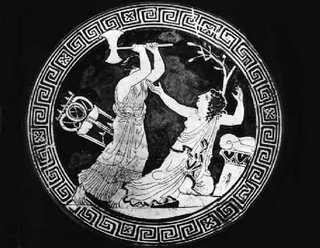To burst in the heart of sunrise
Everywhere we are surrounded by prophesy, of visions of the future we are sailing towards – be it the shimmering surfaces of utopia foretold in the commercial break or the bleak dystopias and die-offs that haunt the billion corners of the World Wide Web. And of course a million or more gradations between the extremes, but it is the polar archetypes that fashion our imagination.
These are increasingly embodied in two female forms: Pollyanna and Cassandra, both figures evoked critically by the followers of the opposing deity.
Pollyanna, or more symbolically Cornucopia – a womb of plenty, is the bountiful, ever giving, optimistic utopian spirit that tells us, half Micawber & half Norman Vincent Peale, that something will come along to solve things no matter how difficult our apparent situation. That the Stone Age did not end for want of stone and the oil age will not end for want of oil, that there are no limits because imagination is infinite. It is the favoured voice of the world, it is can-do and it avoids the darkness and the shadows.

Cassandra, however, is telling us a different tale. She is looking into the darkness, into the shadows. She is warning us to notice the outcome of our actions, trying to open our eyes to what is actually going on around us. She is not necessarily negative – but she is questioning of the status quo, of the thorazine happiness of the consensus trance, and of course she is generally being ignored. The curse of Apollo still hangs around her. Those modern figures who issue caveats regarding our contemporary western way of life are now frequently dismissed as Cassandras by mainstream media and politics. In the media and political context the name Cassandra is read to mean, and used to invoke, the sense of doomsayer and also to imply mistaken nihilist. It remains somewhat shocking to realise that in doing so these commentators misunderstand the myth and simultaneously enact it. The curse of Cassandra is to both see the future truthfully and to be ignored.
But Cassandra’s is a clear voice that we must echo – it is not the abstractions of the Delphic Oracle or the Sybill of Cumae. It is not a confusing bundle of science and theology, practically incomprehensible and demanding interpretation - as many contemporary warnings can be. Cassandra tells us it, as it is.
Can we speak with Cassandra? Can we now heed Cassandra?
'Fore God, mine oracle shall no more hide
With veils his visage, like a new-wed bride!
A shining wind out of this dark shall blow,
Piercing the dawn, growing as great waves grow,
To burst in the heart of sunrise ... stronger far
Than this poor pain of mine. I will not mar
With mists my wisdom.
Aeschylus, 'Agamemnon' (translated by Gilbert Murray in Aeschylus (Oxford University Press, 1940) )
James Piers Taylor
IMAGE: Clytemnestra killing Cassandra, from an Attic red figure cup c.430 BC



0 Comments:
Post a Comment
<< Home